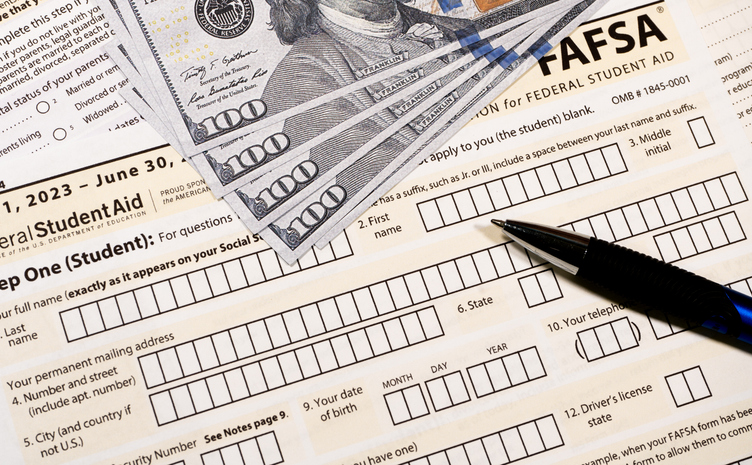Do credit scores affect your eligibility for financial aid? And does taking out student loans impact your credit score later? These are common and important questions, especially as the cost of higher education continues to rise and financial literacy becomes essential for navigating college funding.

Financial Aid and the FAFSA: No Credit Score Required
To access federal financial aid — including Pell Grants, work-study, and student loans — students must submit the Free Application for Federal Student Aid (FAFSA®). This is the only way to be considered for federal aid, and the good news is your credit score has no impact on your eligibility for federal student loans.
The FAFSA is entirely need-based and does not require a credit check for most student loans. Once your application is processed, your college or university will send you a financial aid award letter, which outlines your eligibility for various types of aid — including federal loans, grants, and work-study programs. This letter is unique to each school and can often be negotiated if your financial situation changes or you receive a better offer elsewhere.
Importantly, students — not parents — are responsible for federal student loans in most cases. Parents are not co-signers, and repayment obligations rest solely with the borrower.
When Credit Scores Matter: Private Loans and PLUS Loans
Federal loans may not cover your full cost of attendance. If you need additional funds, you might explore private student loans, which do require a credit check. Private lenders will evaluate your credit score, income (or a co-signer’s), and credit history before offering loan terms. For students with limited credit history, a parent or other adult with good credit may need to co-sign.
Similarly, Parent PLUS Loans, which allow parents to borrow on behalf of a dependent undergraduate student, require a basic credit check. A parent with adverse credit history may be denied unless they obtain an endorser or appeal the decision.
Refinancing student loans after graduation also involves credit checks. A higher credit score may help you qualify for a lower interest rate, potentially saving thousands over the life of the loan.
Understanding Credit Scores: What They Are and Why They Matter
A credit score is a three-digit number, typically between 300 and 850, used by lenders to evaluate your creditworthiness. It reflects your history of borrowing and repaying debt. The higher your score, the more favorably lenders view you — often resulting in better loan terms and lower interest rates.
Your credit score is influenced by:
- Payment history (on-time vs. late payments)
- Amounts owed (credit utilization)
- Length of credit history
- Types of credit used
- Recent credit inquiries
Failing to repay student loans on time can damage your credit, while making consistent, on-time payments can improve it. Starting your credit journey with federal student loans — which offer lower interest rates and flexible repayment plans — can be a smart financial move.
How to Check Your Credit Score for Free
Monitoring your credit score is a healthy financial habit. Here are trusted, no-cost resources:
- AnnualCreditReport.com: The only site authorized by federal law to provide free weekly credit reports from Equifax, Experian, and TransUnion.
- Credit Karma: A free service that provides access to your TransUnion and Equifax scores, plus tips for improving your credit.
- Your bank or credit card provider: Many now offer free access to your FICO or VantageScore as a customer perk.
Checking your own credit score does not affect it. However, applying for new credit — including loans or credit cards — can trigger a “hard inquiry,” which may slightly lower your score temporarily.
Final Tips for New Borrowers in 2025
- File the FAFSA early — even if you think you won’t qualify for need-based aid. Many schools and states use it to distribute grants and scholarships.
- Exhaust federal aid options first, as they typically offer lower interest rates and more repayment flexibility than private loans.
- Establishing credit isn’t bad — when managed responsibly. Making timely student loan payments helps build your credit history.
- Consider whether your school is one of a growing number of no-loan colleges, which meet student need without requiring loans. Explore options here.
Remember: Student loans are a financial tool, not a trap — if used wisely. Learn the basics, monitor your credit, borrow only what you need, and make a plan to repay it. That’s how you build credit and fund your future with confidence.
